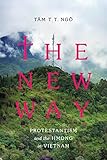The new way : Protestantism and the Hmong in Vietnam / Tâm T.T. Ngô.
Material type: TextSeries: Critical dialogues in Southeast Asian studiesPublisher: Seattle : University of Washington Press, [2016]Copyright date: ©2016Description: 1 online resource (xii, 211 pages)Content type:
TextSeries: Critical dialogues in Southeast Asian studiesPublisher: Seattle : University of Washington Press, [2016]Copyright date: ©2016Description: 1 online resource (xii, 211 pages)Content type: - 9780295806655
- 0295806656
- Protestantism -- Vietnam
- Hmong (Asian people) -- Vietnam -- Religion
- Vietnam -- Church history
- Ethnology -- Vietnam
- Protestantisme -- Viêt-nam
- Miao (Peuple d'Asie) -- Viêt-nam -- Religion
- Ethnologie -- Viêt-nam
- SOCIAL SCIENCE -- Discrimination & Race Relations
- SOCIAL SCIENCE -- Minority Studies
- HISTORY / Asia / Southeast Asia
- Ethnology
- Hmong (Asian people) -- Religion
- Protestantism
- Vietnam
- 305.6/804089959720597 23
- BR1187
- online - EBSCO
| Item type | Current library | Call number | URL | Status | Notes | Barcode | |
|---|---|---|---|---|---|---|---|
 eBook
eBook
|
Biblioteca "Angelicum" Pont. Univ. S.Tommaso d'Aquino Nuvola online | online - EBSCO (Browse shelf(Opens below)) | Online access | Not for loan (Accesso limitato) | Accesso per gli utenti autorizzati / Access for authorized users | (ebsco)1250194 |
Includes bibliographical references (pages 181-199) and index.
The Hmong in Vietnam -- The short-waved faith -- Remittance of faith and modernity -- Millenarianism and conversion -- Not by rice alone -- State, church, and community -- Transformation of morality and subjectivity.
"Traces the unique route through which Hmong in Vietnam discovered Christianity and appropriated it for themselves. Although a significant proportion of Vietnam's population has been Catholic since the days of French colonialism, the Hmong continued animistic spiritual practices shared across Hmong populations throughout Southeast Asia in the remote highland areas where most of them lived. After the Vietnam War, the Far East Broadcasting Company started an evangelical program in Hmong language targeting war refugees in Laos. In the mid-1980s this radio signal was accidentally received by listeners in Vietnam's Northern Highland, who related the content to their traditional expectation of salvation by a Hmong messiah-king who would lead them out of subjugation. Actual missionaries, mostly Laotian Hmong refugees in the US, eventually arrived to help them routinize their new Protestant faith. Today, this New Way (Kev Cai Tshiab) is the claimed religion of roughly one third of a million Hmong in Vietnam. This ethnographic study describes what happened when some Hmong decided to become Protestants while many of their kin kept their traditional religion, how the communist state views their religious activities, and the global dimensions of Hmong Protestant life. Hmong conversion serves as a lens for viewing the complex politics of religion and ethnic relations in contemporary Vietnam and illuminates larger issues such as the dynamic interplay between local and global forces, socialist and post-socialist state-building, Cold War and post-Cold War antagonisms, Hmong transnationalism, and US-led evangelical expansionism"-- Provided by publisher.
Description based on print version record and CIP data provided by publisher; resource not viewed.


